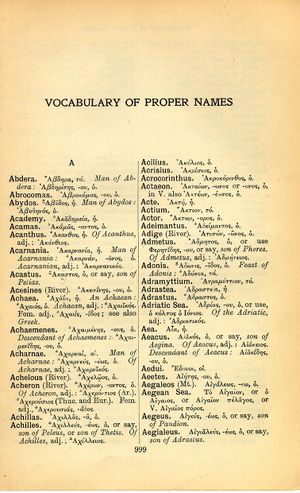Acastus: Difference between revisions
From LSJ
ὅτι χρὴ τοῦ μέλιτος ἄκρῳ δακτύλῳ, ἀλλὰ μὴ κοίλῃ χειρὶ γεύεσθαι → that honey should be tasted with the fingertip and not by the handful
(3_1) |
m (Text replacement - "}}]]" to "}}]]") |
||
| Line 1: | Line 1: | ||
{{WoodhouseENELnames | {{WoodhouseENELnames | ||
|Text=[[File:woodhouse_999.jpg|thumb | |Text=[[File:woodhouse_999.jpg|thumb | ||
|link={{filepath:woodhouse_999.jpg | |link={{filepath:woodhouse_999.jpg}}]]Ἄκαστος, ὁ, or <b class="b2">say, son of Pelias.</b> | ||
}} | }} | ||
{{Lewis | {{Lewis | ||
Revision as of 10:07, 15 August 2017
English > Greek (Woodhouse)
Ἄκαστος, ὁ, or say, son of Pelias.
Latin > English (Lewis & Short)
Ăcastus: i, m., = Ἄκαστος.
I Son of Pelias, king of Thessaly, husband of Astydamia or Cretheis, and father of Laodamia, Ov. M. 8, 306; 11, 410 al.—
II The name of one of Cicero's slaves, Cic. Att. 7, 1 al.
Latin > French (Gaffiot 2016)
Ăcastus,¹⁴ ī, m., fils de Pélias, roi d’Iolcos : Ov. M. 8, 306 || nom d’un esclave de Cicéron : Cic. Att. 6, 9, 1, etc.
Latin > German (Georges)
Acastus, ī, m. (Ἄκαστος), I) Sohn des thessalischen Königs Pelias, Vater der Laodamia, Bruder der Alkestis, Ov. met. 8, 306. – II) ein Sklave des Cicero, Cic. ep. 14, 5, 1.

